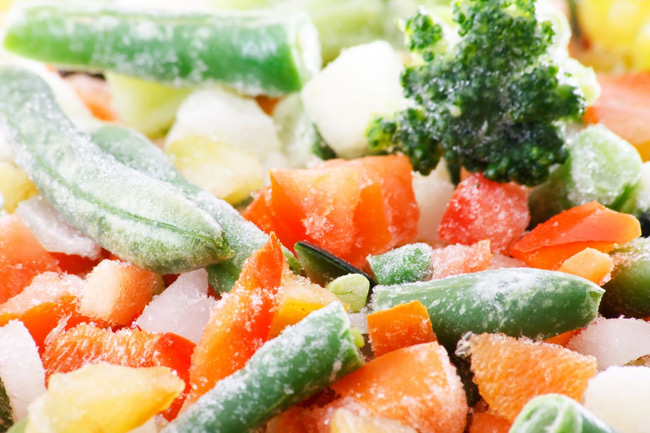Frozen Foods: How Healthy are They?

Frozen foods or
pre-cooked frozen meals are
essentially foods of convenience since they require no preparation
time other than the heating and consuming. Frozen fruit and vegetables can be
healthier, with higher levels of vitamins and cancer fighting
antioxidants, than leafy 'fresh' produce. Some frozen meals may require the
preparer to ensure adequate heating and uniform consistency of component items.
Consuming frozen foods is a matter of personal health choice. In two out of three cases frozen fruit and vegetables scored better on antioxidant-type compounds - including Vitamin C, polyphenols, anthocyanins, lutein and beta-carotene.
To decide what to eat, read through the advantages and disadvantages of frozen
foods.
Advantages
- Freezing food slows down decomposition by turning residual moisture into ice, inhibiting the growth of most bacterial species. In the food commodity industry, the process is called IQF or Individually Quick Frozen (flash freezing). The best process to maintain taste, quality and texture.
- Frozen fruit and vegetables can be healthier, with higher levels of vitamins and cancer fighting antioxidants, than leafy 'fresh' produce as they are chilled in the frozen cabinets soon after harvest until they are eaten. According to the two teams, one from Leatherhead Food Research and another from the University of Chester, carried out 40 tests to measure nutrient levels in produce which had been sitting in a fridge for three days versus the frozen equivalent. They found that frozen broccoli had higher levels of Vitamin C, lutein and four times more beta-carotene. Frozen carrots had three times the lutein and double the beta-carotene, while they were also higher in Vitamin C and polyphenols. Frozen sprouts scored higher on all nutrient measurements, however fresh spinach did better than frozen in some tests. The Chester study found levels of Vitamin C and polyphenols were much higher in frozen blueberries and green beans. The frozen blueberries also had more polyphenols and anthocyanins.
- Pre-packaged meals require very little preparation and contains all the elements for a single-serving meal. A benefit of frozen dinners is that they are usually fully cooked during preparation, and only need to be reheated by the consumer. This eliminates the possibility of undercooking by misjudging microwave powers and cooking times, although packaging warnings often state that the food must be "piping hot" before consumption.
- The small portion sizes of frozen diet meals gives you an advantage over trying to control your portions in a restaurant or even with home cooked foods. Research studies such as one published in the 2006 issue of the "Diabetes, Obesity and Metabolism" journal showed that participants who were served proportioned foods lost more weight than the participants who had to manage their own portion sizes.

Disadvantages
- One of the problems surrounding the use of freezing as a method of food preservation is the danger that pathogens deactivated (but not killed) by the process will once again become active when the frozen food thaws.
- The freezing process tends to degrade the taste of food and the meals are thus heavily processed with extra salt and fat to compensate. Many frozen meals contain between 700 to 1800 mg of sodium. With the daily recommended maximum dosage of 2300 mg of sodium, it is hard to stay in this limit! This puts people with high blood pressure at further risk.
- In order to stabilize the product (parathas, fries, meats, and desserts) for a long period requires companies to use partially hydrogenated vegetable oils. Partially hydrogenated vegetable oils are high in trans fats and may adversely affect cardiovascular health.
How to Make Them Healthy
- Have a large serving of a salad or a side of fruits or vegetables along with frozen foods.
- Avoid buying foods with any kind of cheese sauce. These meals are high in calories and saturated fat.
- Avoid buying frozen fruits packed in syrup.
- Check the food labels carefully. Look for a meal that has less than 600 mg of sodium per serving to avoid consuming the majority of your sodium allowance in a single meal.
The important point to take away is that frozen foods are not healthy on their
own. Restrict their use to only in emergency situations unless it is absolutely
necessary when you don't have any other option left. It is still important to
pay attention to nutrition labels and plan your meals accordingly. If you have
had one such meal, then try and eat fresh food for the others.
Use diet frozen meals sparingly while you are on a weight loss plan.
Ref:
